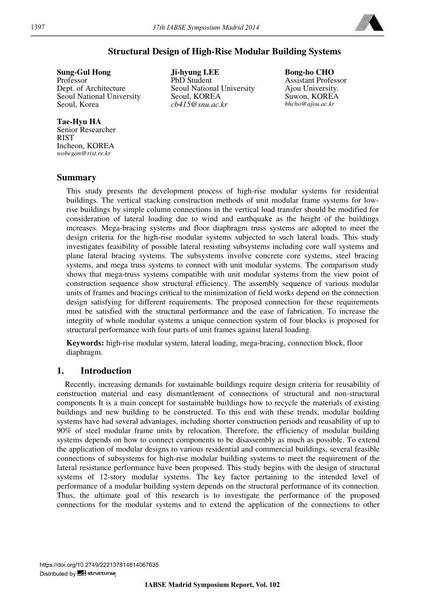Structural Design of High-Rise Modular Building Systems

|
|
|||||||||||
Détails bibliographiques
| Auteur(s): |
Sung-Gul Hong
Ji-Hyung Lee Bong-Ho Cho Tae-Hyu Ha |
||||
|---|---|---|---|---|---|
| Médium: | papier de conférence | ||||
| Langue(s): | anglais | ||||
| Conférence: | IABSE Symposium: Engineering for Progress, Nature and People, Madrid, Spain, 3-5 September 2014 | ||||
| Publié dans: | IABSE Symposium Madrid 2014 | ||||
|
|||||
| Page(s): | 1397-1403 | ||||
| Nombre total de pages (du PDF): | 7 | ||||
| Année: | 2014 | ||||
| DOI: | 10.2749/222137814814067635 | ||||
| Abstrait: |
This study presents the development process of high-rise modular systems for residential buildings. The vertical stacking construction methods of unit modular frame systems for low-rise buildings by simple column connections in the vertical load transfer should be modified for consideration of lateral loading due to wind and earthquake as the height of the buildings increases. Mega-bracing systems and floor diaphragm truss systems are adopted to meet the design criteria for the high-rise modular systems subjected to such lateral loads. This study investigates feasibility of possible lateral resisting subsystems including core wall systems and plane lateral bracing systems. The subsystems involve concrete core systems, steel bracing systems, and mega truss systems to connect with unit modular systems. The comparison study shows that mega-truss systems compatible with unit modular systems from the view point of construction sequence show structural efficiency. The assembly sequence of various modular units of frames and bracings critical to the minimization of field works depend on the connection design satisfying for different requirements. The proposed connection for these requirements must be satisfied with the structural performance and the ease of fabrication. To increase the integrity of whole modular systems a unique connection system of four blocks is proposed for structural performance with four parts of unit frames against lateral loading. |
||||
